Many of our faculty, students, and alumni are recipients of this prestigious grant. We hear from a few members of our community about how the experience changed their lives, and why they wouldn’t be who they are today without it.
Joseph A. Favazza, Ph.D.
President
Babes-Bolyai University in Cluj-Napoca, Romania, January-June 2000
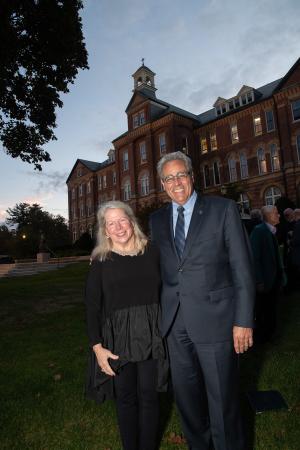
What motivated you to apply?
When I was teaching as part of the Religious Studies department at Rhodes College in Memphis, Tenn., I knew I had a sabbatical coming up. So I was thinking about how best to use the time. A friend of mine alerted me to a Fulbright announcement that invited scholars of religion to apply for a Fulbright in Romania. Since my wife Paddy and I had adopted two children from Romania and had already visited the country, I decided to apply. Subsequently, she was invited to apply, given her field (Early Childhood Special Education) and the great need for special education teachers in Romania.
What did you do?
I taught a course, in English, on sacramental theology. All the students in the course were pursuing dual degrees in Theology and in English. With these degrees, they would be certified to teach high school. I also conducted a small qualitative research project on forgiveness and reconciliation within a religious and political context.
How did it shape your life?
Both my wife Paddy and I were selected as Fulbright scholars at the same time and in the same country. We spent six months in another country with three children, ages 7, 6, and 3 years old. To say it was challenging is an understatement. But we made great friends, some of whom we still stay in contact with. It gave us all wonderful memories and gave us the courage and confidence to pursue other international opportunities in subsequent years. I am a strong advocate for Fulbright, and I continually invite students and faculty to consider applying.
Paddy C. Favazza, Ed.D.
Senior Research Fellow
Babes-Bolyai University in Cluj-Napoca, Romania; Democritus University of Thrace in Alexandropoulos, Greece, and Nicosia with the Cypriot Ministry of Education, January-June 2000
What motivated you to apply?
Years earlier, I had worked in special education in Bolivia and Nicaragua. It was an incredible window into the world, seeing how other countries and cultures supported children with disabilities. So, when Joe was applying to Fulbright, we thought, if we both applied, we could travel back to Romania, the birthplace of our adopted children, and I could learn about persons with disabilities from another cultural perspective.
What did you do?
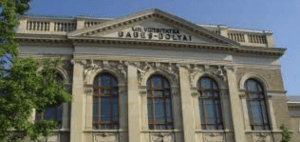
In Romania, I taught a course titled “Education of Children with Disabilities in the United States.” The faculty were interested in exposing students to
the evolution of the field of special education in the U.S. at a time when Romania was struggling to move children with disabilities out of institutions. The course content focused on historical and societal attitudes toward children with disabilities from diverse cultural perspectives, the impact of the civil rights movement in the U.S. on the field of education, litigation and legislation, and the transition from institutionalization to community-based schools. In Greece, I led conversations on home- and school-based strategies to support children with disabilities. In Cyprus, I provided national training on inclusive practices in special education for Greek Cypriot teachers and then crossed the DMZ to provide similar training to Turkish Cypriot teachers in Northern Cyprus.
How did it shape your life?
There were so many takeaways. The fall of communism in Romania was 1989. But in 2000, you could still see evidence of its stifling impact on my students who taught me about their reluctance to have an open dialogue in our class after living through years of repression, the lessons they learned while waiting in line for food rations, their marvel at the decades-long efforts for freedoms we enjoy and take for granted in the U.S. I also saw special education programs in three countries influenced by the intersection of societal attitudes about human differences, poverty, and lack of equity in education. I will never forget being cleared by armed guards to enter and exit the eerily quiet DMZ to provide training on the Turkish- occupied side of Cyprus. The scars of war were still apparent in the landscape and on the faces of people separated from loved ones and land. One year later, the Cypriot Ministry of Education brought me back to do a wider national training. And work brought Joe and I back to Romania years later as well. It was good to return to see positive change and progress in both places. Lastly, while I came back
to teaching and research in the U.S., the Fulbright experience inspired me to continue work in a global context.
Kimberly Kersey Asbury, M.F.A.
Associate Professor, Art and Design
Botswana located in the Kalahari Desert in Southern Africa, 1998-1999.
What motivated you to apply?
As a grad student at Boston University I knew I wanted to return to Botswana, so I applied for a Fulbright grant to conduct research in painting in the Makgadikgadi Salt Pans. I had been to Botswana back in 1993 and 1994 when I was taking a gap year during my undergrad. At that time, I wanted to go to South Africa to be a photojournalist; unexpectedly, I ended up traveling around Botswana on my own. Soon enough, I became a resident of Botswana, where I became an entrepreneur making signs for safari companies. This place became very meaningful to me, this is what drove me to to return through the fellowship program. After my life- changing experience living in Botswana, I wanted to go back to make art that commemorated the impact Botswana made on my heart and worldview. In addition, I also wanted to have a teaching project to help youth in Botswana become artists.
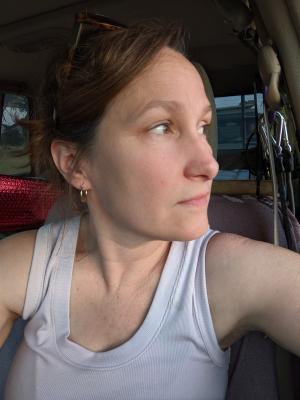
What did you do?
I was a visiting artist at the National Museum and Gallery in the capital of Botswana. My first role was as juror for the national children’s art exhibition, which was quite the honor. I gave artist talks there but spent most of my time at the Maun Senior Secondary School, the high school, where I worked with 20 students. I invited a series of professional artists from Botswana and Zimbabwe to mentor participants through critiques, similar to what I do now at Saint A’s.
How did it shape your life?
I was deciding between law school or returning to Botswana to be a lifelong resident, but the Fulbright helped me realize there is so much good that can be happen through education. I knew that if I were not awarded a Fulbright, the application process itself had helped me define my goals, interests, and values. I realized then that you can do anything if you believe in yourself.
It is a wonderful program that is more important now than ever before. It is a way of connecting with people in other countries and furthering mutual understanding. The Fulbright alumni network is incredible because it is full of individuals who care about service. I believe the Fulbright experience matches Saint Anselm College’s Benedictine mission of helping others.
Bede Bidlack, Ph.D.
Professor, Theology
Taiwan, 2009-2010
What motivated you to apply?
I was basically gambling my Ph.D. on it. I was translating a Song Dynasty Daoist text, and I needed help. I went to Taipei to confer with scholars who translate ancient Chinese texts into modern Mandarin. I also used the time interview contemporary Daoists about their understanding of the text and their current practice. Scholars in the United States are not Daoists; Daoists in the United States often are historically and sociologically removed from the tradition. I needed to go to Taiwan for scholarly and authentic sources.
What did you do?
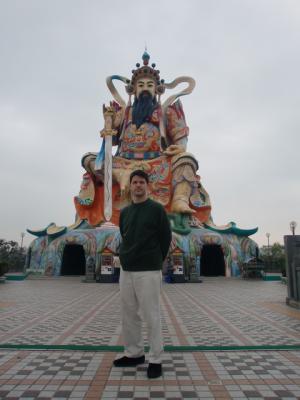
I was executing a research project of translating the preface to the 13th century, Inner Meaning of the Wondrous Scripture of the Highest, Limitless Salvation (Yuanshi wuliang duren shangpin miaojing neiyi). In this preface, there appears some fantastic images. One of them, a picture of a mountain with a stream running through it, was the focus of my study. Rather than a mountain, it is actually the image of a Daoist in sitting meditation in the process of total spiritual transformation. My analysis became a portion of a larger work of comparative theology, In Good Company: The Body and Divinization in the Thought of Pierre Teilhard de Chardin, SJ and Daoist Xiao Yingsou (2015), that I published as a monograph with Brill.
Community engagement is also part of the Fulbright experience. I was active in my parish in Taipei. There were members of the parish who wanted to work on their English, so I taught a course on lectiodivina in English. The hospitality of that parish and the people of Taiwan cannot be overstated. Their good example has challenged me to be that much more generous with my time and treasure. I’m enjoying paying it forward.
How did it shape your life?
I wouldn’t be where I am in my career or at Saint Anselm College without that experience. I needed the help of the scholars of Taiwan and other scholars I met there to finish my translation. In particular, I have to mention Dr. Hsieh Shiwei, Dr. Xiao Jinming, and Dr. Michael Stanley-Baker, who just gave and gave. Dr. Xiao also helped me publish my one work in Chinese, a short article about Daoist practice in Taiwan.
On a personal level, the people I met turned into networks of friends. Last summer, for instance, I had the opportunity to host Dr. Marco Lazzarotti, an Italian scholar. I had never met Marco, but I received the request to host him from a mutual Dutch friend, Dr. Lennert Gesterkamp, with whom I worked in Taiwan. The experience also taught me the power of studying a language. I was able to communicate with Japanese friends in Taiwan through our mutual second language, Chinese. These networks and experiences reflect the success of the program: creating a global people through international exchange.
At home, Fulbrighters themselves make their own special friendships. Though we worked on many different things in Taiwan, I became friends with the other Fulbrighters there. Just this past December, a bunch of us Fulbrighters from that year got together in Philadelphia for a reunion. Though we travelled from as far away as London, we felt getting together, even for a short while, was worth the trip.
Loretta Brady, Ph.D. ’99
Professor, Psychology
Cyprus in January-May 2013; Berlin, Germany, 2014
What motivated you to apply?
I was mentored in my undergraduate research McNair scholar program by a faculty at UNH who had done her graduate research in Denmark as a Fulbright scholar. Ever since learning of the program, I set my sights on pursuing as many Fulbright fellowships as I could over my career as a faculty. My goal is to apply for another Fulbright for the 2026-27 academic year.
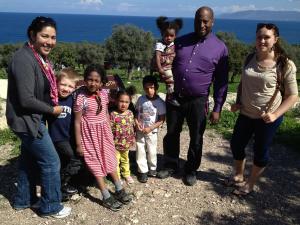
What did you do?
In my Fulbright, I worked with the Cyprus federal enforcement, treatment, and prevention agency to assess and develop countrywide capacity for trauma informed addiction treatment. I conducted evaluations of providers, met with patients, and met with ministries of health and other social service organizations to build awareness and knowledge of trauma and addictions intersections for women in recovery and for men. Since the country is only two generations away from its 1974 civil war, there is a great need for trauma services, and my time in Cyprus helped connect some providers and institutions around the topic for the first time. I was able to travel to Greece in 2014 to train clinicians there on the approach used in Cyprus. By that time, the translation of a treatment manual had been finalized for use in Greek-speaking communities across Europe. I am still in touch with clinicians in Cyprus; on a quarterly basis since 2021, I have provided clinical debriefs for a team of clinicians serving a high-profile family case. My work is to help them manage the questions that arise in their work and to provide research for the team to consider in their working to support family attachment despite parental incarceration.
How did it shape your life?
I loved my experience. We lived in Cyprus during a period when the country held the EU presidency (which rotates across Eurozone countries every six months), and the country also experienced a banking crisis with people, including us, not being able to access their savings for weeks. This experience combined with the impact of the research around capacity-building changed my interest in policy-making and large-scale systems change. It laid the foundation for the work I now do in my Community Resilience & Social Equity Lab at the College.
Melissa DeLury, Ph.D. ’10
Ph.D. student, George Mason University
Madhya Pradesh, India, 2017-2018
What motivated you to apply?
Professionally, I was at the stage where I was exploring doctoral programs (having just received my master’s at Trinity College Dublin) and wanted field experience doing international education research. I had lived and worked in India previously (in 2012) and still had strong relationships with people in Madhya Pradesh. When I left India in 2012, I left with more questions about the role of education in rural communities. This inspired me to continue exploring these questions at Trinity College and then again with this Fulbright project. Specifically, I was interested in exploring the impact of the national Right to Education Act in rural communities in India (i.e., in Madhya Pradesh). How does a national policy like RTE get implemented in a country as vast and diverse as India? How is it being implemented in rural Madhya Pradesh? What are the experiences of teachers, students, and administrators? These were the questions that I wanted to explore during this Fulbright.
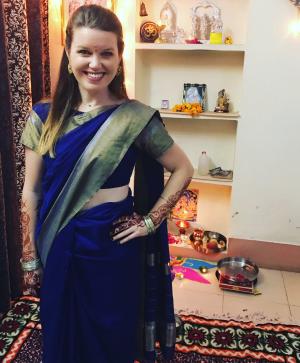
What did you do?
I started the Fulbright grant with the understanding that I would do my research project alongside Dr. Nirmala Menon (a former Saint Anselm professor who had invited me to join her at IIT Indore, where she currently teaches Digital Humanities) and her Digital Humanities Research Lab, collaborating with other Ph.D. students working on similar projects. However, when I arrived at IIT Indore, UNICEF India approached IIT Indore with an opportunity to work with them on researching the impact of the Right to Education in rural Madhya Pradesh. What were the chances?! I became a field investigator with the UNICEF/IIT Indore team, where I observed classrooms, talked with teachers and students as well as ministers in various government agencies in Madhya Pradesh. My role was essentially to listen and engage. By living and working within my community in Indore, I was able to build relationships that allowed me to gain a deeper understanding of what education means to different members of the community. This could greatly inform policy, especially how to improve access to quality education in rural environments.
How did it shape your life?
On a professional level, my Fulbright shaped me into the researcher I am today, where I seek ways to privilege the voices and experiences of community members in both my Ph.D. research and technical work as an education manager for an international development contractor in Washington, D.C. I’m currently in my fourth year of my Ph.D. program at George Mason University, where my studies focus on the role of history education in divided societies, using decolonial, participatory, and indigenous methodologies. At MSI (an international development contractor), our team advocates for more participatory and locally led ways of doing assessments and evaluations of USAID education projects. My Fulbright experience shaped this focus in all aspects of my professional work. On a personal level, this is also how I try living my day-to-day life. Staying curious and open, talking to people, and learning about others’ experiences. By doing this, we can try to do a small part in building peace in our families and communities.
Dina Frutos-Bencze
Associate Professor, Economics & Business
Faculty of Informatics and Management (FIM), University of Hradec Kralove (UHK), Hradec Kralove, Czech Republic, Fall, 2021.
What motivated you to apply?
I have always been interested in living in the Czech Republic for an extended period. My mother is Czech, but we emigrated when I was about 4 years old. Thanks to her and to short visits to relatives during my childhood I am fluent in Czech. I always thought about what it would be like to live, work and basically ‘function’ in the Czech Republic as an adult. I was also hoping to share my expertise with Czech students and expand my research collaboration network.
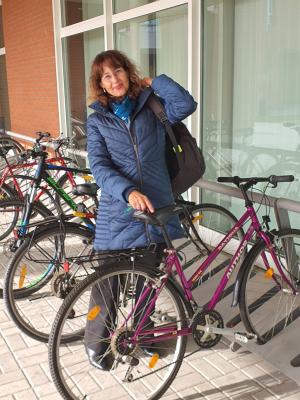
What did you do?
My grant award was to teach and conduct research. I taught a graduate level elective for the Master’s in Information Management program (Modern Management Methods: International & Comparative Management), and “Introduction to Social Innovation” for the undergraduate Information Management program. I enjoyed immensely interacting with Czech students. Their proficiency in English was impressive.
Regarding research, I joined two different research teams. One of the teams was focused on research about organizational culture and human resources management (HRM) issues. The other team was focused on research about innovation and R&D topics. Each team used different instruments and methodologies, so it was a great learning opportunity for me. I developed a good rapport with these research teams, and since my return I’ve continued to collaborate with them on new projects.
How did it shape your life?
Receiving the Fulbright Scholar Award was an amazing opportunity. I learned a lot about the higher education and cultural context of the Czech Republic. I am the type of person who always seeks challenges and opportunities to grow and learn personally and professionally, so this type of exchange was everything I dreamed.
I am now a member of the SAC Fulbright Committee and a board member of the NH Fulbright Chapter. Every semester, I introduce the Fulbright program to my students. I also encourage them to consider applying for a Fulbright Student Award after graduation. I also encourage my faculty colleagues to explore the various grant opportunities the Fulbright Commission offers. My scholarship and teaching have been enhanced by this experience. Fulbright Scholar award recipients are eligible to apply for another Fulbright Scholar award two years after the date of completion of the previous award. I’m not sure yet, but I think I will consider applying again in the future, perhaps to another country.
Mathew Masur, Ph.D.
Professor, History
Vietnam, 2002-2003
What motivated you to apply?
I was conducting research on my Ph.D. dissertation. I wanted to look at South Vietnamese government documents from the 1950s and early 1960s, but they were only available at the National Archives facility in Ho Chi Minh City (formerly Saigon). I would not have been able to complete this research without the financial support of the Fulbright program.
What did you do?
A typical day involved going to the National Archives building, looking at the finding aid, requesting documents, deciding whether they were relevant, and then photocopying them. I also spent time at a library that had a collection of old South Vietnamese books and magazines, most of which were not available outside of Vietnam. I spent some of my time reading the documents, but in many cases I just made photocopies so I could take more time to read them when I returned to the U.S. I lugged home probably over a thousand pages of photocopies.
How did it shape your life?
I can safely say that I wouldn’t have ended up at Saint Anselm if not for the Fulbright. The fact that I had done extensive research in Vietnam was one of the things that impressed the History Department when I applied for the job here. I am still in touch with many of the people I met while I was in Vietnam: Vietnamese scholars at the local university, other Americans and Europeans who were studying Vietnamese history and society, and expats who were teaching English in Ho Chi Minh City. The experience was formative in other ways as well. I had been to Vietnam before but living there for almost a year was different. I had to navigate things like renting an apartment, shopping at the local market, and driving myself around on a motorbike. It was a lot of fun, but it also made me feel more mature and independent.
Br. Andrew Thornton, O.S.B.
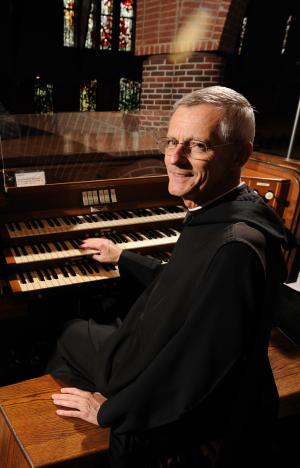
Bonn and West Berlin Germany, 1985
What motivated you to apply?
I applied for the Senior Fulbright Award because it promised to provide firsthand knowledge of the central institutions and issues in the Federal Republic, one of the cornerstones of the European Union and one of the U.S.’s closest and most important allies.
What did you do?
I attended lectures, discussions, and site visits in the capital of the Federal Republic, Bonn, and West Berlin. Venues included the Bundestag, political parties, labor unions, factories, and government agencies. Thanks to the Fulbright Award, I was able to bring to my classes in German language up-to-date knowledge of Germany and Germans.
How did it shape your life?
The greatest impact of the award came five years later, with the fall of the Berlin Wall and the beginning of German reunification. I was once again studying the contemporary situation, this time in the soon-to-be-reunited Germany and its future capital, Berlin. Our group from Saint Anselm arrived some six months after the fall of the Berlin Wall; in fact, on the very day on which the moribund People’s Republic of Germany adopted the West German currency. The Fulbright experience had prepared me well to sense the momentousness of the change that was happening and to realize what challenges and unlooked-for possibilities lay ahead for the German people.
If you are an interested in learning more about Fulbright opportunities for students at Saint Anselm, visit our Fulbright Programs page.
